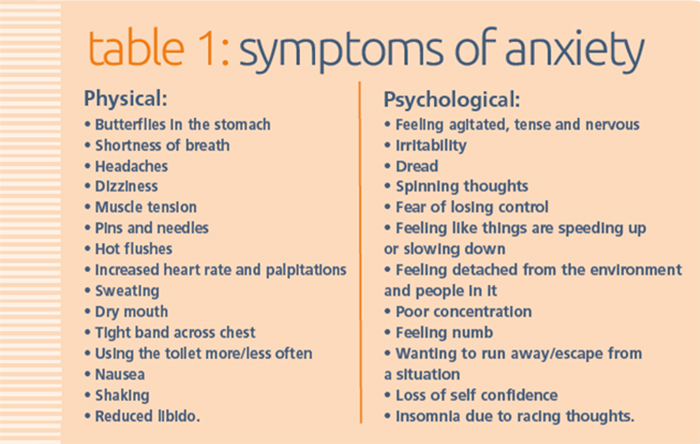Population Health

Breaking point
In Population Health
Bookmark
Record learning outcomes
While a little stress and anxiety is normal, excessive or prolonged symptoms can push a person beyond their limits. But pharmacy staff can be on hand to help customers manage and prevent symptoms
Whether it’s work pressure, financial strain, relationships, illness, moving house, bereavement, violence or even something like running late to meet a friend, it’s safe to say that we’ve all experienced stress and anxiety at some point. While a little stress is normal, and can even be beneficial, for some people it can be overwhelming as they feel as if they are losing control – and this can have a detrimental impact on their health and day-today lives.

According to the Health and Safety Executive, stress accounted for 43 per cent of all working days lost due to ill health in 2014/15 and the Department of Health estimates that work-related anxiety, stress and depression are costing the UK economy £70 billion annually. Some 12 million adults in the UK see their GP with mental health problems each year, most of whom are suffering from stress-related anxiety and depression. And there will be many more who haven’t yet sought help. Therefore there is a real opportunity for pharmacy teams to offer information and to help customers identify the causes of their stress and anxiety, manage their symptoms and prevent more serious issues from developing.
Stress and anxiety explained
Stress and anxiety are closely linked, with each being a possible cause and symptom of the other. In fact, according to Anxiety UK, the majority of people develop anxiety after having been under stress for a period of time.
The ‘fight or flight’ response is associated with both stress and anxiety. This is where the body releases hormones such as cortisol and adrenaline to make it easier to fight an impending threat or run away – it’s this hormone release that causes people to feel exhilarated, alert and even perform at their best. Neil Shah, chief de-stressing officer at The Stress Management Society, says: “We’ve made stress out to be a bad thing, but we need a certain amount of pressure to thrive. Not enough and you get bored, sluggish and lethargic, but you can only take so much pressure before you collapse. In the middle of these two is the performance zone where we’re at our very best.”
Understanding the signs
Most people who have symptoms of anxiety for the first time have what’s known as subthreshold anxiety, which means that their symptoms have been present for less than six months. Subthreshold anxiety is sometimes confused with a modern, busy lifestyle, as the condition is associated with at least two of the following symptoms: restlessness, fatigue, poor concentration, irritability, muscle tension and sleep disturbance.
But anxiety can manifest itself in a whole host of other symptoms ranging from physical to psychological (see table below). The physical signs are often easy to spot and are noticed first. However, many people will not consider that anxiety is the cause behind these symptoms. It is often only once the emotional symptoms appear that anxiety is identified. “I’d say about nine out of 10 people with anxiety contact pharmacy staff with physical symptoms,” says Nicky Lidbetter, chief executive of Anxiety UK. “It wouldn’t be atypical for repeat presenting, so a customer with a headache coming to the pharmacy counter regularly for relief. Yes, the physical symptoms are there, but anxiety might be the cause.”
In this case, treatments will ease the physical symptoms but won’t address the underlying source and if it’s not dealt with effectively, anxiety can severely affect everyday life. Long-term anxiety has also been implicated in severe chronic health conditions, including further mental health disorders such as depression and bipolar disorder, heart disease, stroke, chronic respiratory disorders and gastrointestinal conditions.
“Pharmacy staff need an awareness of what the physical symptoms are in the first place,” says Nicky. “It’s important to be asking questions, not jumping to the conclusion that it’s a physical cause, so pharmacy staff should feel confident to ask the appropriate questions to get to the bottom of the symptoms.” However, Nicky is quick to point out that “thyroid problems and perimenopausal symptoms can manifest as anxiety so it’s important to rule things like that out too with a visit to the GP”.
So how do people know when to take action? Chris O’Sullivan, programme lead, business development and engagement, The Mental Health Foundation, explains that in general “we’re justified to do something about it if there are prolonged symptoms of stress and anxiety for around two weeks or more – unless they’re particularly severe,” in which case immediate action can be crucial. Chris also comments that phrases such as “just a panic attack” are unhelpful in terms of stigma. “It may not be a heart attack, but any symptoms of stress and anxiety should be a beacon to take action.”

Identifying triggers
The main trigger for anxiety is stress. Anything and everything can cause stress and factors that trigger it depend on a person’s resilience. A situation that causes symptoms in one person may not affect someone else. “It’s cumulative so lots of little things can overwhelm. For one individual one thing drives stress and for others it’s a build up of lots of little things,” explains Chris. But whatever a person’s resilience, stress is only healthy if it’s short-lived.
“Stress is fickle and can hide away from you, but it’s important to recognise the causes,” says Chris. Keeping feelings hidden can intensify symptoms, causing a vicious cycle that can be difficult to break out of and so talking stress and anxiety concerns through with a partner, friend or healthcare professional can help people unburden themselves and take the first steps to finding a solution. As Chris points out: “Identifying the beast slouching in a dark corner makes it less intimidating.”
Once someone else is aware of the concerns, they can then help the person take a step back and pinpoint their personal triggers. “The goal should be to work out if there’s something going on, what can be immediately done to tackle it and work out whether self help will be sufficient or if outside help is required,” says Chris. “And then, if you can, put in place an action plan,” he adds. This involves taking steps to minimise the impact of stress, “so if it’s the commute that people know makes them stressed then they can leave earlier or cycle to work, anything that will make it easier for them,” says Neil.
Pharmacy support
Experts are in agreement that pharmacy teams have a role to play in helping people who are experiencing stress and anxiety. “Mental health isn’t an alien concept to pharmacy staff,” says Chris. “They’re humans too so it’s important to show that compassion and empathy, and pharmacy staff are trusted in the community and I think that’s a really good thing. They should be confident to give advice,” he adds.
The role pharmacy can play in improving the availability of non-stigmatising mental health information and advice is so valuable, says Chris. And certainly, when it comes to stress and anxiety, there is an issue about acceptability and stigma – although as Nicky comments, anxiety is at the “more acceptable end” of the mental health scale.
“The placing and environment of pharmacies within the community is much better than the GP for supporting patients,” says Nicky. “I can’t over-emphasise how difficult it is for people to have that dialogue about mental health issues, but stocking posters about organisations and promotion materials can be a huge help, as can signage showing the availability of a private room for conversations. Acknowledging the condition in this way is highlighting that the pharmacy understands and can help and support people,” she adds.
Similarly, drawing attention to other support options that are available locally can be of benefit. “Community resources can include exercise classes, support groups or the local Samaritans and it can be helpful to create a factsheet of all this information to give people to take away as it provides them with the means to do something about it,” explains Chris. “If people have recognised the signs and tried self-help strategies to no avail then they should speak to their GP about what might work for them,” he continues. “A structured cognitive behavioural therapy course might help, or medication could be useful if their GP believes that would be beneficial for them.”
It’s this role of giving advice to help customers manage stress and anxiety that Nicky champions too. She comments that although medication does have a role if anxiety is severe, it shouldn’t be the first port of call and instead, helping customers to review and adapt their lifestyle should be a priority. “I really believe lifestyle is important, so exercise, healthy diet, not overdosing on caffeine. Lack of sleep heavily affects mood so getting enough quality sleep is important too.”
Chris adds that pharmacy can help with smoking cessation, if necessary, as the damage already done to the body through smoking can put people at greater risk of developing further health problems when stressed and anxious.
Taking time to relax can make a big difference to mental and physical wellbeing and Chris suggests exercise as the best way to do this. “Exercise takes the mind off the situation, but there’s also a physical release of endorphins which calms you down too,” he explains, before adding that practising mindfulness can also help. Mindfulness is paying attention to the present moment rather than worrying about the past or future and enables people to change the way they think and feel about stressful experiences. “It can also help for people to think about the things that make them happy and relaxed, things that put them in a good mood and also things that get them down,” says Chris. “They should be encouraged to make a conscious effort to do less of the bad and more of the positive. It sounds simple, but it works!”
Boost your knowledge
Making sure that pharmacy staff are as confident in supporting customers with mental health concerns like stress and anxiety as they are with physical ailments is important. To this end, Chris suggests that pharmacies consider options available for staff training, whether that be mental health first aid, a suicide prevention programme or something else. “And consultation skills too,” Chris adds. “If a customer comes in ill quite often then having conversation starters and knowing what questions to ask to investigate further is important. Pharmacy staff already have many of these skills so they can utilise them further and build on them.”
Identifying the beast slouching in a dark corner makes it less intimidating
